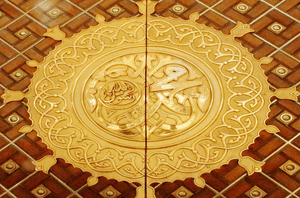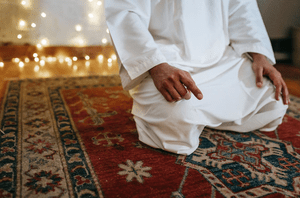Think of the human being you love the most. Imagine a situation where you have not met for a year. Now is the time for you to finally reunite.
How will you feel? What will be running through your mind? How fast will your heart be beating?
Similarly, every ṣalāh is an occasion in which you reunite with Allah (ʿazza wa jall) after having been parted. You should feel the same trepidation and excitement at its arrival. As you journey towards Allah (ʿazza wa jall), in and outside of your ṣalāh, there are three primary emotions you should try to cultivate in your heart: hope, fear and love.
“The heart in its journey to Allah is like a bird. Love is its head, and fear and hope are its two wings. When the head is healthy, then the two wings will fly well. When the head is cut off, the bird will die. When either of the two wings is damaged, the bird becomes vulnerable to every hunter and predator.” – Ibn al-Qayyim (raḥimahullāh)
Hope
Hope in Allah (rajā’) is the first of these three emotions. Open your heart and allow it to become overwhelmed with the mercy and kindness of Allah (ʿazza wa jall). Rajā’ springs from thinking good of Him and attaching your heart to Him. In a ḥadīth qudsī, Allah stated, “I am as My slave thinks of Me” (Bukhārī).
Remember that Allah (ʿazza wa jall) wants to forgive you. Allah does not want to ‘catch you out.’ Rather He ‘catches’ you when you fall, so long as you turn to Him. Allah (ʿazza wa jall) wants to forgive you, shower you with His mercy and guide you to Paradise. Believe this from the bottom of your heart.
Belief in the heart is not enough however. Your belief must be accompanied by action. You must make a distinction between rajā’ and tamannī (wishful thinking). Tamannī is when you fail to take action, yet you still hope for a good outcome. Conversely, rajā’ is when you take the means and place your hope in Him.
Such a hope, or rajā’, is achieved by acknowledging everything Allah has blessed you with. Always return to the Source of every blessing in your life: Allah (ʿazza wa jall), the Supreme Provider (al-Razzāq).
Another powerful way to fill your heart with hope in Allah (ʿazza wa jall) is by reflecting on His Beautiful Names. The more you know Allah, the more hope you will have in Him. Allah is al-Muṣawwir (The Fashioner); He has created you in the most beautiful form. Allah is al-Raḥmān (The Extremely Merciful); His mercy encompasses all of His creation. Allah (ʿazza wa jall) is The Concealer of sins (al-Sittīr); He (ʿazza wa jall) will not expose you despite the multitude of your sins. Allah (ʿazza wa jall) is Gentle (al-Rafīq); He loves gentleness. Allah is The Most Compassionate (al-Ra’ūf); His compassion knows no ends. Allah (ʿazza wa jall) is The Most Modest (al Ḥayiyy); He feels shy to turn you back, empty-handed.
What choice do you have other than to have hope in Him?
Fear
Fear is the second emotion which should overwhelm you in ṣalāh. Fearing Allah (ʿazza wa jall) should make you tremble in awe of Him and humble you in front of Him.
Some say that we should mainly focus on loving Allah (ʿazza wa jall) and having hope in Him. They argue that positivity will bring people closer to the dīn. However, this is misleading and can damage our understanding and application of the dīn. Allah (ʿazza wa jall) says, “…They used to race towards the good deeds and invoke Us with hope and fear; and they were humbly submissive to Us” (21:90).
In a ḥadīth qudsī, Allah (ʿazza wa jall) says, “By My Glory, I will not combine two fears nor two assurances for My slave: if he feared Me in the world, I will grant him safety on the Day of Judgement. And if he felt safe from Me in the world, I will make him fear Me on the Day of Judgement.” (Ibn Ḥibbān)
In life, you tend to run away from what you fear. For example, anyone who is scared of spiders or rodents will freeze or run away upon seeing them. However, fearing Allah (ʿazza wa jall) is unique and beautiful. It makes you flee to Him, and not away from Him. The more you fear Him, the more you turn to Him.
A fear of worldly matters is usually accompanied by a dislike of it. However, the fear of Allah is coupled with love and respect. You are in awe of Him. Although Allah (ʿazza wa jall) is beyond all worldly examples, think of an elderly grandfather or an older person who is well-respected. As soon as he enters the room, everyone falls quiet out of respect for him. The silence is not because this elder is a tyrant of the household; rather, it is because of the respect that his family accords him. This type of fear is known as haybah or khashyah, a reverential type of fear. It is this emotion that the senior Companion ʿAmr b. al-ʿĀṣ (raḍiy Allāhu ʿanhu) felt when he was in the presence of the Messenger of Allah ﷺ . He said even though he ﷺ was the most beloved of people to him, he could not describe him. This is because whenever he was in his company, he was unable to look directly at his blessed face. He would lower his head and humbly gaze downwards, out of deep respect and awe.
The fear of Allah (ʿazza wa jall) is not an irrational fear. It is a fear built on knowledge. The more you get to know Him, the more you fear Him. You are in constant awe of His majesty, greatness and power.
When the Prophet ﷺ saw Jibrīl (ʿalayhis-salām) in his original form, he had 600 wings, and his huge size filled the horizon between the sky and the earth. Jibrīl is the best of angels, who was tasked with the most prestigious responsibility of transmitting the word of Allah. Despite his physical and spiritual greatness, the Prophet ﷺ saw him on the night of Miʿrāj (ascension) looking like “a worn-out piece of cloth due to the fear of Allah” (Ṭabarānī). Jibrīl’s knowledge of Allah’s majesty and greatness reduced him to this state.
Aim to strike a balance between excessive fear and a lack of fear. If there’s too much fear, you’ll end up in despair. And if there’s too little, you’ll become complacent and feel secure from Allah’s punishment. Fear is a deterrent. It prevents you from becoming distracted, disobeying Allah and falling off the right path.
Three steps to cultivate fear in your heart
1) Reflect on Allah’s greatness, grandeur and majesty.
2) Reflect on the gravity of standing before Allah (ʿazza wa jall), the terrors of the grave, the horrors of the Day of Judgement, the sharpness of the ṣirāṭ and the torment of the Hell-fire.
3) Think about your sins and shortcomings. Reflect on how little you have prepared for your journey to the hereafter.
A life between hope and fear
The pious people of the past would advise that during good times, when you are more likely to forget Allah (ʿazza wa jall), you should increase your fear of Him. And during difficult times, you should increase your hope in Him. Other scholars stated that throughout one’s life, fear should be dominant over hope; but towards the end of one’s life, hope should become dominant.
When Muʿādh b. Jabal (raḍiy Allāhu ʿanhu) was in his final moments, he turned to Allah (ʿazza wa jall) and said, “O Allah, indeed I used to fear you, but now I have hope in You. O Allah, indeed, you know that I did not love the world nor want to remain in it for long to dig wells or plant trees. Rather it was to experience thirst in the midday heat during the long fasts; to struggle through standing for hours at night in prayer; and to kneel in the company of scholars in the gatherings of dhikr.”
Anas (raḍiy Allāhu ʿanhu) reported that the Prophet ﷺ entered upon a young boy who was dying. The Prophet ﷺ asked him, “How are you?” The boy replied, “O Messenger of Allah, I swear by Allah that I have hope in Allah and I am scared over my sins.” The Messenger of Allah ﷺ said, “These two (qualities) do not gather in a slave’s heart in such a moment except that Allah gives him what he hopes for, and protects him from what he is scared of.” (Tirmidhī)
Love
Love is the third – and most important – emotion.
Love is the greatest station the seeker on the path to Allah (ʿazza wa jall) can attain. The love of Allah (ʿazza wa jall) is the purest and greatest of all loves. It gives life to the heart, it is sustenance for the soul, and is the roadway to eternal success. When your heart overflows with His love, you will experience genuine bliss and contentment. Ibn Taymiyyah (raḥimahullāh) said, “Know that there are three things that push the hearts towards Allah: love, fear, and hope. The strongest of these three is love; and it is something that is sought-after in and of itself, since it is something that is desired both in this world and the hereafter, as opposed to fear, which will disappear in the Hereafter. Allah says, ‘For certain, the friends of Allah shall have no fear, nor shall they grieve’ (10:62).”
Our purpose in life is to worship (ʿibādah) Allah. ʿIbādah consists of: (1) utmost humility and (2) utmost love. Without love, there is no ʿibādah. Without love, we fail in actualising our purpose of existence. Love is the ‘soul’ of worship.
Loving Allah (ʿazza wa jall) is beautiful. It cannot be compared to loving any of His creation, as His creation will cease to be, whilst He is the Ever-Lasting. His creation has limits, whilst He is the Limitless, the All-Encompassing and the Most Able. Loving Allah (ʿazza wa jall) is beautiful because there is no one kinder, more giving and more appreciative than Him. As humans, we are prone to making mistakes, and we are prone to not forgiving those who have erred. On the other hand, Allah (ʿazza wa jall) loves to forgive and will forgive us even if we go to Him with mountains of sins. Our fellow humans tire of our persistent questioning and begging. However, Allah (ʿazza wa jall), our Generous Lord, does not stop giving and is angered when we don’t ask from Him!
“Love puts the slave on the path to his Beloved; and the speed and strength of his journey to Him is in accordance with how strong or weak this love for Him is.” – Ibn Taymiyyah (raḥimahullāh)
Loving Allah (ʿazza wa jall) can only be achieved when you prefer Him over everything else. You must love Him more than you love your parents, children, spouse, friends and wealth.
Love – by the consensus of the scholars – is an obligation (farḍ) and one of the fundamental aspects of the dīn. When considering matters that are farḍ in our dīn, loving Allah (ʿazza wa jall) does often not cross our minds. Moreover, when we reflect on loving Allah (ʿazza wa jall) , we tend to equate love to obedience. We often limit our perception of Allah (ʿazza wa jall) as someone Very Powerful and Scary. Yes, Allah (ʿazza wa jall) is Extremely Powerful, and this should make us tremble, yet equally, there is nothing more soothing and comforting to the soul than His love.
There is a vast difference between someone who obeys Allah (ʿazza wa jall) out of love for Him, and someone who obeys Him without love. When a lover obeys his beloved, the obedience is done willingly and sincerely. Such a level of obedience differs from that brought on by force. The former experiences happiness and joy in willingly complying to the orders, whereas the latter feels burdened, and may even resent the order. Love, therefore, is the driving force and the impetus of ʿibādah.
It is this love of Allah (ʿazza wa jall) that makes the slave-Creator relationship special. This love makes the servant eager to be in His company, to converse with Him and do everything possible to please Him. Obedience with love is not just a tick-box exercise that solely involves the fulfilment of obligations. Instead, it consists of a sincere desire to be with Him and remember Him. Love makes the slave eager to meet Him. Love is what makes him cry out in the depths of the night, “My Lord, do not deprive me of the greatest joy: the joy of seeing You in the Final Abode.”
The next time you stand up for your ṣalāh, fill your heart with the aforementioned emotions: hope, fear and love.
اَللّٰهُمَّ – إِنِّيْ أَسْأَلُكَ حُبَّكَ ، وَحُبَّ مَنْ يُّحِبُّكَ ، وَحُبَّ عَمَلٍ يُّقَرِّبُنِيْ إِلَىٰ حُبِّكَ –
(O Allah), I ask You for Your love, the love of those whom You love, and the love of deeds which will bring me closer to Your love (Tirmidhī).
“Know that when the love of Allah (ʿazza wa jall) becomes firm in the heart, its effects appear on the limbs: the slave diligently obeys Him, eagerly serves Him, and strives to attain His pleasure. He finds joy in privately conversing with Him, is content with His decree, and longs to meet him. He derives comfort in remembering Him, feels estranged with other than Him, flees from the people, and seeks intimacy with Him in seclusion. The world departs from his heart; he loves everything Allah loves and prefers Him over everything other than Him.” – Ibn Juzayy (raḥimahullāh)






